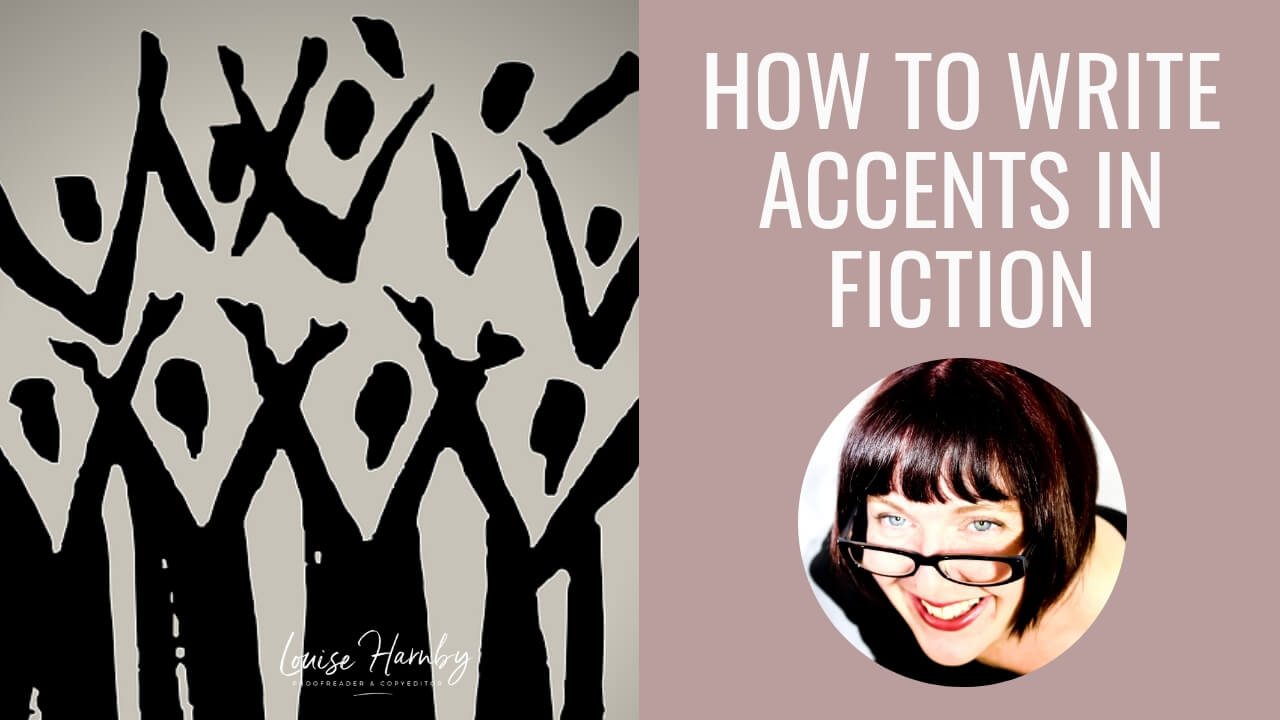|
This article offers guidance on how to self-edit your fiction writing so that accents don’t become the primary story.
Do your characters speak with an accent? All of us speak in ways that are distinctive; we just don’t notice our own accents because they’re ours and we’re used to them.
Oxford Dictionaries defines accent as ‘A distinctive way of pronouncing a language, especially one associated with a particular country, area, or social class.’ Authors who are inexperienced at writing accented language can be tempted to use phonetic spelling. But writing accents is difficult; so is reading them. Most experienced authors and editors will therefore caution against this approach. Furthermore, spelling and pronunciation are two different things. Says Beth Hill in The Magic of Fiction (pp. 409, 394):
‘All English speakers would spell the words in the sentence you’re reading the same way; they just might pronounce them differently. [...] Dialogue is a report of the words that are spoken, not a visual of how they’re spoken. Show the how through means other than odd or phonetic spellings.’
Avoiding the inexperienced-ear trap
My husband was born in Belgium. He speaks fluent French. My friend Alain was born in southern France. He also speaks fluent French. They can hear strong differences in their pronunciation. Alain knows that Johnny’s accent is Belgian though he can’t tell what part of Belgium Johnny was born in. Johnny can tell that Alain is from France, and can even identify that he’s from the south, but not where in the south. I have enough French to get by, but it’s limited. When I hear Johnny and Alain speaking French to each other, I can’t hear the difference in their accents because my ear isn’t experienced enough. I also have friends and family from Yorkshire, England. To me, their accents sound the same, but I know they’re not. Nor are the turns of phrase they use. That’s because people in Yorkshire don’t all speak the same, even if those of us with inexperienced ears think they do. And I don’t speak identically to every other person born in Buckinghamshire, or use the same turns of phrase. And there’s the first problem. The ways accents are rendered by a writer will be influenced by their experience of that accent. If their experience is limited, any attempt to mimic it in writing could seem absurd to a reader with a more experienced ear. It could even turn into parody, and a bad one at that. Consider how much we’re influenced by others. Many of us talk to and listen to voices from all over the world. Speech is elastic and we often borrow from each other – not just words and phrases but pronunciation too. What each of us defines as accented, or not accented, will depend on where we’ve been, who we know, and what we’ve heard.
When phonetic spelling trumps story
Conveying accents through phonetic spelling can lead to phonemes trumping action. Here’s a mangled example of a French person speaking English. The spelling is phonetic:
Ze corpse was found in ze woods zis morning. ’Ow did zat ’appen? Ze area was checked only yesterday. Sumsing iz wrong ’ere.
If the protagonist detective is French, and every time she opens her mouth this is what we have to read, our focus won’t be on the plot. The most important thing about the sentence above is what it tells us: a corpse was found in a section of the woods that had been given the all-clear. Which means either the area wasn’t cordoned off and guarded, or the team didn’t check the area properly. That’s not what the reader will be focusing on. Instead they’ll be digging their way through a multitude of zeds. It’s a distraction that pulls the reader out of the story. Plus, we need to ask whether that phonetic spelling renders the speech authentic. I’d argue it’s a horrible inauthentic caricature that has no place in any work of fiction that isn’t intended to mock. My friend Alain mastered the th phoneme within a few weeks of living in the UK. Yes, his English was – and still is – accented (just as mine is to others), but if he was my detective, the most realistic way I could render this line in his mouth would be:
The corpse was found in the woods this morning. How did that happen? The area was checked only yesterday. Something is wrong here.
Which is just like I’d say and spell it in English. And so would my Scottish friend Denise, and my Canadian friend Janet, and my American friend Carrie, my German friend Nicole, my Yorkshire-born friend Helen ... you get the picture. We all have different accents, but conveying them with phonetic spelling is distraction not enrichment. Deliver what you promised and what’s interesting If your reader thought they were buying a mystery, a thriller, a romance or sci-fi opera, they might be disappointed to find out they’re reading something else. Lessons in how your Dutch, Indian, Welsh or British protagonist or transgressor pronounces words are not what they paid for. Furthermore, is your character’s accent really their most interesting trait? That they’re from a particular region or country might be enriching backstory. It might even play into the plot line. But is their accent key to the story? If it’s not – if it’s no more relevant than how they take their coffee – it needn’t go on the page, and if it does, it need only be in passing.
Respect your audience now, then and from wherever
There’s more than one way of speaking English. Just because I speak in a certain way, doesn’t make it standard. It’s just my way of speaking. But there’s a bigger problem. Seeking to render pronunciation ‘authentically’ can reinforce discrimination:
‘A stereotypical rendering of regional accent or dialect based on racial, cultural or ethnic "difference" could cause offence. Accent and dialogue in fiction may perpetuate harmful stereotypes. The simple-talking so-called "native" features strongly, for example, in fiction of past eras that either consciously supported or failed to question supremacist projects of conquest and domination.’ (Now Novel)
Writers need to examine their own biases (however unintentional) when they convey accents, and other characters’ perceptions of them. Plus, at the very least, overworked or badly done written accents can sound like mockery. And even if you think your writing is amusing, your reader might not. Years ago, I worked on a book in which the protagonist – for whom we were rooting – mocked his German arch-enemy for his ‘ridiculous’ pronunciation of a w as a v when speaking English. Actually, it was the protagonist and the author who ended up looking ridiculous because there is no ‘correct’ way to pronounce a w that can be universally applied across the planet. If one character’s mockery of another’s accent is central to the plot, that might be an opportunity to introduce phonetically spelled written accents briefly, but it will be a device that shows the mocker as ignorant and closed-minded. If that’s not your intention, and it doesn’t drive the novel forward, don’t include it. Make things easy for your reader The best novels make us forget we’re reading them. We’re so immersed in the story that we don’t notice we’re processing words on a page. Every time a writer forces us to decipher how a word sounds, they risk dragging us out of their book. If a book is littered with accented narrative and dialogue, we might not even get to the immersion stage. Say Mittelmark and Newman (p. 151):
‘No matter how good an ear you have, and how perfectly you’ve captured it, it soon becomes a task to read. The reader is forced to sound out each word, like somebody studying ESL, and will soon grow impatient. Instead, one or two well-placed words sprinkled throughout are enough to flavour the whole thing.’
‘Ah, but what about Irvine Welsh?’ you might say. This review on Goodreads reflects my own experience of Trainspotting:
‘I must have read the first page of Trainspotting more than twenty times since purchasing the book years ago, and each time I would put it back in fear of all the Scottish dialect. There's no point lying, this is a challenging novel. Sometimes you have to read things twice or pause to think about them to fully understand what’s being said. But, unlike a lot of books that are difficult to read, this was ultimately rewarding and once you get used to the slang words it becomes a very gritty, moving and funny read.'
Yes, he’s a great writer and it’s a great book, but I found it hard work. And I’m not always in the mood for hard work. I read for relaxation. If you think your audience is like me and this reviewer, think twice about whether you want to go down this route. Plus, it’s unlikely that any writer will be able to pull off what Welsh does if they’re writing accents and dialect that aren’t their own.
Other ways to convey accent – light flavouring
‘When doing any kind of accent, whether regional dialect, foreign accent, or a characteristic like a lisp, it is important to remember that a little goes a long way.’ (Mittelmark and Newman, p. 151)
So how might we gently nudge the reader to imagine a character’s accent in a way that avoids literally spelling it out? Here are 6 ideas: 1. Snippets of another language If the character’s from another country, you could add in a few of their native-language words here and there. Agatha Christie peppered her Poirot novels with mais ouis and mon amis (and Sophie Hannah has followed that style in her Poirot continuation mysteries). Christie didn’t go over the top though, and nor does Hannah. In Closed Casket, Poirot speaks at length, sometimes over several pages, and there’s no hint of a non. Less really is more. You could also introduce words from the character’s original language in moments of stress. Bear in mind, though, that lots of swear words (e.g. fuck) have an international appeal, so even a non-native English speaker might prefer this over their own language. I confess to being a little bemused when I read Poirot’s French snippets. He speaks English fluently, as this short excerpt from The ABC Murders (p. 3) demonstrates:
‘C’est vrai. To grow the vegetable marrows. And immediately a murder occurs—and I send the vegetable marrows to promenade themselves to the devil [...]'
The French therefore seems a little out of place. Poirot is able to use metaphor artfully, yet reverts to his native language for a simpler phrase. To some readers it will look a little contrived and old-fashioned. Still, it’s Christie, and she published this book in 1936. Fair enough. That doesn’t necessarily mean it’s right for your contemporary novel. 2. Noticing another’s accent Another character might notice someone’s accent – perhaps a Brit enters the scene in a novel set in the US, and the American protagonist notices the way they pronounce a hard t. In this case, it’s an observation that tells us something about the Brit’s voice, and from then on the reader can imagine their idea of how that would sound. No more need be said about it. This approach is best done early on. A character might frame another’s accent in terms of thoughts about how they themselves struggle to roll an r with the ease that the Parisian they’re listening to does. Or your character might convey another’s country of origin by pointing out how excellent their English is and how, for example, their Swedish or Russian accent is barely discernible. 3. Idiom and localization Localized or idiomatic words and phrases can also provide triggers for a reader that help them imagine accent. So perhaps your visiting Mancunian momentarily throws the people they’re hanging out with in Baltimore when they use the terms pissed or pants. And a character could identify another’s accent in the narrative by way of appreciating it. Again, it gives readers just enough information to do their own imagining. Check with people in the know if you use this approach. Say Mittelmark and Newman (p. 107):
‘When you use idioms incorrectly, it makes you sound as if you come for a different culture than the reader, and possibly a different planet.’
However, this warning might be something you can use purposefully if it’s suitable for your plot. 4. Contractions and dropped consonants You could sprinkle the dialogue with just a few dropped consonants or contractions to convey accent (’appen, innit, ain’t, nowt, t’other). Again, less is more. It shouldn’t stand out more than the story. 5. Grammatical structures that trip in translation Learn about other regional and grammatical structures that you could introduce once in a while. Says Now Novel:
‘Take the example of Russian immigrants to English-speaking countries. In the Russian language, there are few auxiliary verbs (verbs such as the verb “to be” or “is” are inferred from context). Thus errors such as “he good man” (for “he is a good man”) or “you go work tomorrow?” occur.’
Still, take care not to overdo these to the point of caricature and cliché. 6. Stories from other places Bring in other details that characterize a person’s place of birth – a detail about the environment, culture or food preferences, for example. Some years ago I was in Oslo in winter. I was cold and commented on the woeful weather to my friend. He replied: ‘Here in Norway, we say there’s no such thing as bad weather, just inappropriate clothing.’ Another half-Norwegian friend (I know quite a few Norwegians!) once told me about one of her favourite childhood snacks, Svolvær postei (it's a kind of fish paste). We scoffed our way through several tins of the stuff one delicious afternoon. That, not her pronunciation, is what sticks in my mind when I think of her Norwegianness. For the novelist, those kinds of small details might be a more enriching way of conveying a person’s heritage than butchering the spelling of their dialogue.
Why focus on that accent?
One final thing to consider is why you would focus on one character’s accent and not every other’s. Remember, everyone speaks with an accent, whether our own ears recognize it as such or not. So imagine you’re an American living in the US. You’re in a cafe. Most of the people around you are from the US and pronounce words the way Americans do – which is to say, differently but broadly with an American accent. You don’t notice this because these accents are familiar to you. Then four Brits join your table and begin to speak. You notice their accents because they stand out for you. However, the four Brits think their accents are uninteresting because they’re familiar with their own pronunciation. Your American accent is the one that stands out. Now imagine that cafe is your novel and the people are your readers. What’s interesting – what stands out – depends on who’s doing the listening. The contemporary reader watches movies and TV, and listens to radio and podcasts. All of us are exposed to multiple voices and accents. We're used to noticing them, absorbing them and moving on. When I’m reading Ian Rankin’s Rebus novels, which are set in Scotland, I’m not given frequent reminders that the primary characters speak with Scottish accents. When I’m reading Harlen Coben’s Myron Bolitar novels, which are set in the US, I’m not told that the characters speak with American accents. Why would the authors made a big deal of a Belgian, Indian, Swedish or British accent but not a Scottish or American accent? That’s not to say it wouldn’t be interesting to know where those people come from if that’s relevant to the story, and it might serve to ground the viewpoint character’s perceptions of their own nationality and pronunciation, but it wouldn’t excuse phonetic renditions of people talking differently. Consider, therefore, whether it’s necessary to make an issue of one of your character’s accents just because their pronunciation stands out to your ear when you’ve been happy to ignore the ‘home’-accented voices in your book. Any mention should be purposeful. Summing up It isn’t necessary to write accents. There are other more interesting ways to show where someone’s from. Focus on the story you’re telling and how you’re going to move it forward rather than worrying how the speakers pronounce their vowels and consonants. If you give the reader a little background and a light peppering, they can do all the imagining for themselves. If you still feel compelled to convey accents in your fiction, do so purposefully and sparingly, especially if they’re accents that you’re not familiar with. And watch out for caricature, parody and bias. Cited works and related resources
Louise Harnby is a line editor, copyeditor and proofreader who specializes in working with crime, mystery, suspense and thriller writers.
She is an Advanced Professional Member of the Chartered Institute of Editing and Proofreading (CIEP), a member of ACES, a Partner Member of The Alliance of Independent Authors (ALLi), and co-hosts The Editing Podcast.
40 Comments
7/1/2019 06:10:28 pm
Fantastic post as usual, Louise. You've put into words exactly the problems I have with phonetically spelled dialogue – and shone light on a few things I hadn't considered (why that one accent, indeed). I also appreciated the reminder that conveying accent (phonetically or otherwise) isn't the only way to create a sense that a character is from a certain place!
Reply
Louise Harnby
7/1/2019 06:15:30 pm
Thanks, Luca. Glad you enjoyed it!
Reply
8/1/2019 11:21:30 am
Good article, and while I agree with much you've put forth, there's nothing worse than characters with no defining verbal trait and all sounding the same as the narration (author voice). Dickens was a master in portraying accents in dialogue, and authors, every bit as much as actors, should be able to convey true sense of time and place and occasional inflection of voice - merely nuance of key words can set characters apart and allays need for reminders of who is speaking. Sample of Dickens: Dickens exploits several linguistic features to capture Weller’s Cockney (London) dialect. Consonants are frequently omitted, as in ’ere (here), as are vowels or whole syllables as in ’tain’t (it isn’t) and ’cept (except). Spelling is used to suggest a different vowel quality, as in gal (girl), or socially marked pronunciation such as nothin’. Dialect grammar appears in ain’t (isn’t), a lookin’ and more tenderer. Perhaps the most unfamiliar feature to us is the switching of v and w in words such as inwariable and wery. Glaswegian (Scot) is barely understood in parts of Scotland - south of the border it might as well be a foreign language, so yes, As a reader I want to be transported to time and place, more especially with historical novels.
Reply
Louise Harnby
8/1/2019 11:49:49 am
I agree with you, Francine. I hope I've covered your points in numbers 1, 3, 4 and 5 of the solutions. Lovely to have some additional examples. I love more tenderer!
Reply
10/1/2019 06:44:54 pm
Yes! Nothing makes me throw a book away faster than having the author present my Southern American accent in a ludicrous phonetic spelling. It feels like I am being demeaned and really gets my dander up!
Reply
Louise Harnby
10/1/2019 08:55:01 pm
Exactly that, Libby. I can imagine your accent well enough, though no doubt imperfectly. Doesn't mean I should try to write it!
Reply
11/1/2019 03:58:19 am
Great piece which I’ve reblogged with an added blurb of my own experiences of reactions of awe, playfulness, interest, and sheer mockery of my own Scottish accent here in the USA.
Reply
11/1/2019 04:18:16 am
Terrific post. I wish I had read this years ago. I've struggled with this and find using syntax pretty useful in conveying an accent. I will be posting the link to this on my blog. Thanks for the post.
Reply
11/1/2019 08:05:53 am
I am writing the black southern American accent as I'm pretty familiar with it. But there are two Brits in my story (1 black & 1 white) that my protagonist hears in the dark. I really need to find a way of showing this since we meet these people the same time the protagonist does.
Reply
Louise Harnby
11/1/2019 10:03:19 am
Hi, Sherrie. Not sure I can give ideal advice since I'm not editing this, but might you have the protagonist overhearing something the Brits reference about where they come from? Think about some of the guidance I gave in the blog post - snippets of stories from other places, like dialogue in which people compare their current environment with the one in which they originate from; or perhaps they're moaning about (or delighting in) the weather compared to what the weather was like when they left the UK, or how long their journey took, or commenting on the poor exchange rate when they converted pounds to dollars! Something like that! I don't know these characters' back stories so only you can know what they might be talking about. Better still, might the protagonist simply notice the accent, and having done that move on to more interesting things? That way, you're telling the reader what you want them to know but not making a big deal of it. It's just a nudge. Bear in mind that there are lots of different British accents and they are determined by where people live. Black and white likely won't come into it. A Black guy from Yorkshire will speak with the same accent as a white guy who lives down the road from him (and I'm white but I speak with the same accent as my Black friends who I grew up with) so I'd urge caution in relating ethnicity to pronunciation for your Brits.
Reply
13/1/2019 10:10:45 pm
I forgot to mention what a great post this is. Very helpful to those of us who want to include foreigners in our cast of characters. 16/1/2019 10:59:30 pm
Hello, 11/1/2019 01:05:48 pm
Food for much thought. Bits of accent do help to add colour to different characters, but not overdone. I got around having one of my protagonists speaking in broad Scots by having him only do it (to stop stuttering) in the presence of a rather overwhelming heroine. The odd exclamation is also effective. One of my cat characters is fond of saying 'quivering whiskers!'
Reply
Louise Harnby
11/1/2019 02:46:12 pm
I'm loving quivering whiskers!
Reply
11/1/2019 01:47:02 pm
This is a great piece, Louise. Thank you. I have recently finished my first novel and there is a smattering of regional UK dialect (Gloucestershire) throughout. Ploos, 'orror of 'orrors, I 'ave a coople of (comedic) scenes involving French characters and, 'aving read dis, I zink I need to rewrite zee dialogue.
Reply
Louise Harnby
11/1/2019 02:48:31 pm
Glad you found it helpful, Tessa. Smatterings are good but I'm glad you're sorting out zee French! ;)
Reply
Lindsey Russell
11/1/2019 11:55:23 pm
Excellent no nonsense article. I cringe when I see novice writers trying to capture accents in an attempt to sound 'authentic'. There is no need. Convey the character comes from the 'Eastend', Glasgow, or 'Birmingham' and the reader will put their own interpretation of what that character sounds like. In historicals a few 'old' words are acceptable to give a hint of a different era but not something that looks like Shakespeare could have written it.
Reply
Louise Harnby
13/1/2019 02:35:53 pm
Thanks, Lindsey. Glad we concur!
Reply
Daniel
11/4/2020 01:37:22 am
This is exactly the problem, though. What’s your “own interpretation” of someone who comes from Birmingham? I can hazard a guess it’s stereotypical and misinformed.
Reply
Louise Harnby
11/4/2020 02:23:25 am
I don’t understand your comment, Daniel. Why do you assume that?What we’re saying is that if a book features a character from Birmingham, there’s no need for their dialogue to be spelled any differently to a the dialogue of a character from Norwich. People from Birmingham spell the word ‘beautiful’ the same way as people from Norwich even if the way they both pronounce it is ever so slightly different.
Stuart
16/1/2019 02:35:25 am
A fascinating and well-argued piece, thank you so much for your very thoughtful analysis. I do wonder about the relevance of "ownership" to the use of phonetic spelling, though.
Reply
Louise Harnby
16/1/2019 10:02:14 am
Hi, Stuart. Great question. I think intention absolutely comes into it, as does audience. Your friend's writing is not a pastiche but patois, which is a recognized dialect, with its own spelling and grammar. It may seem non-standard to a white British female like me, which is why if I were including it in a novel, I'd use it very cautiously (and after some research!), whereas your friend has the authority to use it when- and wherever he chooses because he knows how to do it, much the same as Welsh knows how to write in a particular Scottish dialect authentically because it reflects his own life experience.
Reply
16/1/2019 11:14:45 pm
Hello again,
Reply
Louise Harnby
17/1/2019 11:41:50 am
Hi, Sherrie. Everyone has an accent! You might not be able to differentiate the different British accents you're hearing on our TV shows because you're less familiar with them, but I can!
Reply
Wonderful article. Very informative. In my novel, Hearts of Emerald Bay, an important secondary is Scottish. I introduce him by telling the reader that his first line of dialogue is spoken with a Scottish accent. After that he will use Aye and Lass sporadically throughout the book.
Reply
Louise Harnby
29/1/2019 09:48:11 am
I absolutely love that approach, Doug. No messing around. You nudge your reader with a little peppering, then let them do the accent work while you get on with doing what you do best: telling a story!
Reply
lily
24/10/2019 05:27:41 am
Diana Gabaldon wrote the OUTLANDER series with thick, heavy Scottish brogue and accent and I love it. Every story I've loved from Dickens to Christie to Nero Wolfe has characters with accents. If it's done lazily or poorly it reads fake and inauthentic but I don't think not doing is good at all, it leads to boring characterizations. I love accents in characters, I love interesting people and places. The world would be dull if everyone sounded the same - and everyone doesn't! Thankfully
Reply
Louise Harnby
24/10/2019 03:05:27 pm
Yes, Gabaldon uses nudges well. She doesn't spell every word as the person *says* it with a broad Scottish accent; instead, she peppers the lines with just enough hints. It never turns into parody. That takes skill and a solid understanding of how her spelling will be heard in the mind-ear of the reader.
Reply
22/5/2020 07:52:50 am
Thank you Louise. I was about to press submit on my short story for a competition. I was unhappy with something, so I scoured places I trust for help. I found what It is right here. My protaganist is a cockney ... you can see without reading it my dilemma. How to convey this in a short, without making the classic mistake of cliche. It is also a tale that tickles the funny bone. Phonetic spelling needs removing, but subtle pointers can stay. I have to to do it and see which way works best. I believe I know thanks to you and this post. X
Reply
Louise Harnby
22/5/2020 11:24:31 am
Thank you, Ellen. So glad it helped. And good luck with the competition!
Reply
30/6/2020 08:58:50 pm
I was in perfect agreement with the author of this article until she started banging on about the importance of not offending anyone. If the history of literature was one of avoiding causing offence, it would be a very short one, not to mention dull. There would, in essence, be no literature worth consuming. One of the great things about the story of literature is that it has caused so much offense, so often, and to such a wide variety of people. I'm thankful, for example, that Fyodor Dostoevksy never took the line that he should only write books that failed to offend, because had he done so, we would never have heard of him. In fact, he most likely would never have bothered putting pen to paper. The same goes for... oooh... pretty much every novelist worth reading. And I had to laugh at the following statement: "And even if you think your writing is amusing, your reader might not." Seriously, why on earth should I care if my readers (or a certain portion of them) don't find my work amusing? I'm not in the business of writing for the sake of my bloody readers. That's a very slippery slope. Getting back to the question of accents in fiction, I think John le Carré does well with the Russian character Dima in 'Our Kind of Traitor'. Dima's accent is not spelled phonetically, but we can tell he's Russian due to the syntax, vocabulary, etc. This approach has just the right lightness of touch. (I apologise if anyone Russian is offended by my comments, or indeed anyone related to a Russian, or anyone who can find it on a map, etc., etc., etc.) [Bows, scrapes, goes down on one knee.]
Reply
Miss Ft
21/4/2021 08:14:13 pm
Hi, Erin! Based on your comment, it seems you are familiar with how accents are portrayed in literature. I am currently researching how these accents are translated, specially the ones that show how the mother tongue influences their second language (e.g a French speaking English). I'd really appreciate if you could provide some novels that you know show this phenomenon.
Reply
8/3/2024 10:40:00 pm
Erin,
Reply
Miss Ft
21/4/2021 08:07:52 pm
Hi, there! I got here by researching dialects in literature. For my dissertation, I want to research how dialects are portrayed and how these are translated into different languages, specially those dialectical marks that are shown when speaking a second language (e.g a French person speaking English). I need to gather at least 10 novels that show this phenomenon. I’d be really thankful if you could repply to this comment with some examples. Thanks in advance!
Reply
8/3/2024 10:25:47 pm
Forgive me, but I have to point out the faux pas of calling another language a "dialect." I learned from an educated Latino that the Spanish dominant culture has taught people to call the native Indian languages "dialects." It diminishes the status of the native language & should not be used UNLESS the people are speaking a form of the language with the native language thrown in here and there.
Reply
Crystal Kaulbars
10/7/2023 02:37:57 pm
Thank you so much, Louise. I was about to commit this error and was so glad to find your blog, because it would've been very unintentional, but still a great mistake. I'm just writing a series of personal stories about long ago trips and other experiences. In this particular recount, we'd gone to Mexico as children, and this was our first visit there, and I was showing the interaction of the first person we met. I'd written in his dialogue phonetically, but before publishing it on the little site for others to read it, I wanted to check out if this would be considered a faux pas in these hyper conscious days. Now I'm so glad I did, so I avoided the pitfall. Thank you and I've faved your blog to give me more guidance as I write them.
Reply
Thanks for an interesting article with good information and advice.
Reply
8/3/2024 10:11:51 pm
Wow, this discussion shows up in my mailbox every year or so & each time I get more out of it.
Reply
Todd Griffin
24/6/2024 07:51:00 pm
What a lovely and informative read.
Reply
Leave a Reply. |
BLOG ALERTSIf you'd like me to email you when a new blog post is available, sign up for blog alerts!
TESTIMONIALSDare Rogers'Louise uses her expertise to hone a story until it's razor sharp, while still allowing the author’s voice to remain dominant.'Jeff Carson'I wholeheartedly recommend her services ... Just don’t hire her when I need her.'J B Turner'Sincere thanks for a beautiful and elegant piece of work. First class.'Ayshe Gemedzhy'What makes her stand out and shine is her ability to immerse herself in your story.'Salt Publishing'A million thanks – your mark-up is perfect, as always.'CATEGORIES
All
ARCHIVES
July 2024
|
|
|
|






















 RSS Feed
RSS Feed





